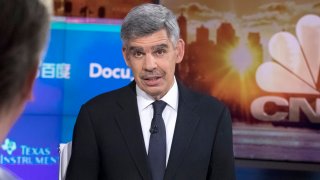
In celebration of Financial Literacy Month, CNBC Invest in You is featuring weekly stories from highly regarded business figures, including financial advice and lessons they have accumulated over their careers.
For investors, 2020 was a year of extremes. In February, the longest bull market of the century came crashing down, only to rebound and reach new highs within a year.
Millions of Americans lost jobs and wages with no safety net to catch them, while a new breed of retail investors entered the markets and dominated headlines.
The old adage, "knowledge is power" has never been more true. Financial literacy can be among the keys to success and economic freedom. We spoke with market, small business and finance leaders about what it means to them.
Get Boston local news, weather forecasts, lifestyle and entertainment stories to your inbox. Sign up for NBC Boston’s newsletters.
Allianz's chief economist, Mohamed El-Erian, says that financial education is important because it allows investors to "play better offense, better defense."
Financial acumen on the offensive allows investors to earn more money, manage that money smarter and protect their money from unforeseen risk.
Money Report
When it comes to defensive maneuvers, El-Erian implores investors to avoid three big traps. Firstly, the debt trap, or when you acquire too much debt. Thanks to low interest rates more Americans have been able to refinance their debt and pay it back quicker than they have been in decades.
El-Erian also warns about inflation traps and liquidity traps. Rising inflation, or the rise in general price levels, has an increasing number of investors and small business owners worried, with 17% of the 10,000 small businesses surveyed listing inflation as their highest concern, and the market experiencing volatility on the way to its new highs as it fights off fears the Fed will let the economy run too hot, sparking runaway inflation.
Those inflations fears have, for now, proven manageable. And a strong economy is a result of informed market participants, according to the CEO and president of the Nasdaq, Adena Friedman.
"Leveraging the financial education that is available is a big part of what makes our (U.S.) economy so strong," said Friedman.
Retail investors have flooded into the markets over the past year and being able to understand the mechanics of the markets is an important factor in their success. Financial literacy also gives people the confidence to open small businesses, according to Friedman.
Sol Trujillo's love of baseball led to love of math, a subject he considers the cornerstone of financial literacy. The co-founder of the Latino Donor Collaborative taught himself statistics to keep up with his favorite players and teams.
Baseball is a statistician's dream. Every action on the field is documented to create reams of data that can give a clear picture of the performance of a team or even a player.
"I used to keep track of all the players and their batting averages and their RBIs, all kinds of statistics because I did the math ... I learned how to do things and process things quicker in my mind."
In many communities, small businesses offer more than a paycheck, they offer a pathway to success. Maria Contreras-Sweet, the Small Business Administration's former leader, believes that in order for entrepreneurs to be successful they have to be financially literate.
"You can have a good idea. But when you have financial empowerment you know how to execute, you know how to access capital and you can scale," said Contreras-Sweet.
Contreras-Sweet emigrated from Mexico with her family when she was just five years old. She credits her financial education with her ability to open California's first Hispanic-founded commercial bank in more than 35 years. "I learned about how to save money, how to invest it and to use it well," she said.
The most famous physicist in history, Albert Einstein, once said that the most powerful force in the universe is compound interest.
Noah Kerner, the CEO of savings and investing app Acorns, says that it is not enough to be financially literate. Investors need to remember and learn from history.
"It's not just about knowing, it's about remembering at the right moments so that you make the right decisions. You need to remember the power of sticking with it during difficult times. You need to remember that every downturn is followed by an upturn."
SIGN UP: Money 101 is an 8-week learning course to financial freedom, delivered weekly to your inbox.
CHECK OUT: 3 B2B side hustles that could make you $100/hour or more, according to a small-business consultant via Grow with Acorns+CNBC.
Disclosure: NBCUniversal and Comcast Ventures are investors in Acorns.






